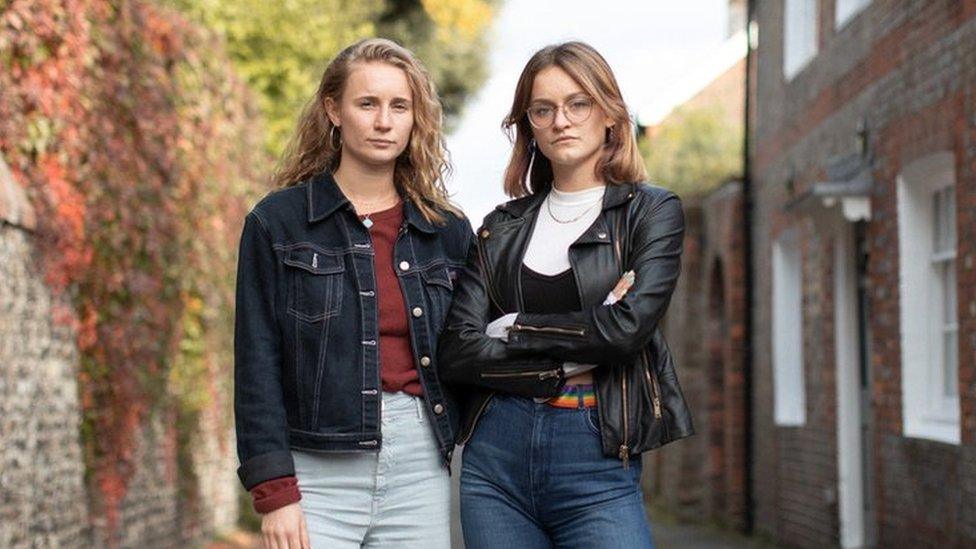Sarah Everard: Met Police chief will not resign over vigil scenes
- Published
Sarah Everard: Met chief 'won't resign' over Sarah vigil police clashes
The Met Police chief has said she is not considering her position, after the force was criticised over its handling of a vigil for Sarah Everard.
Officers handcuffed women and removed them from crowds on Clapham Common in London on Saturday.
Commissioner Cressida Dick said she was "more determined" to lead the Met.
The home secretary has commissioned an independent investigation into the force's decisions, which were taken in the light of Covid restrictions.
Sources said both Priti Patel and the prime minister had confidence in Dame Cressida.
Dame Cressida said she agreed on the need for a "sober review" and defended how officers responded to the "really big crowd".
"Quite rightly, as far as I can see, my team felt that this is now an unlawful gathering which poses a considerable risk to people's health," she said.
"I don't think anybody who was not in the operation can actually pass a detailed comment on the rightness and wrongness... This is fiendishly difficult policing."
She added: "What has happened makes me more determined, not less, to lead my organisation."
Prime Minister Boris Johnson said Ms Patel had commissioned the police watchdog, Her Majesty's Inspectorate of Constabulary (HMIC), to "conduct a lessons learned review in to the policing of the event".
In a statement on Sunday night, he said he was "deeply concerned" by the scenes on Clapham Common and that Dame Cressida had "committed to reviewing how this was handled".
He will chair a meeting of the government's crime and justice taskforce on Monday to "look at what further action we need to take to protect women and ensure our streets are safe".
"The death of Sarah Everard must unite us in determination to drive out violence against women and girls and make every part of the criminal justice system work to protect and defend them," he added.
Earlier, Ms Patel said she had read a report from Dame Cressida about Saturday night's events, but "questions still need to be answered".
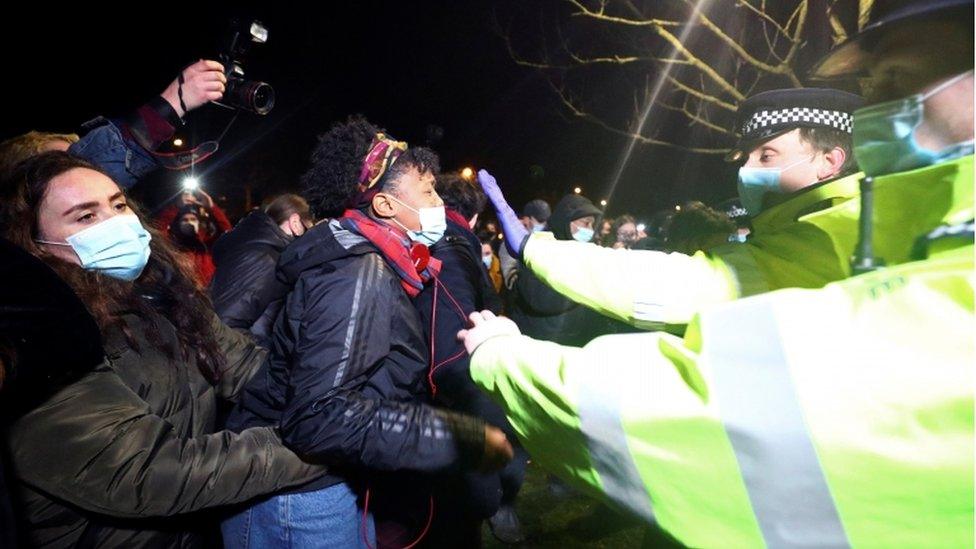
London Mayor Sadiq Khan had also called for an investigation, describing police actions as "unacceptable".
Mr Khan said he had spoken to Dame Cressida and the deputy commissioner, and that he was "not satisfied with the explanation they have provided".
In a statement posted on Twitter, he said he wanted HMIC to conduct a "full independent investigation of events" - and the Independent Office for Police Conduct to "investigate the actions of police officers".
An official vigil planned on Clapham Common - near where Ms Everard was last seen alive on 3 March - had been called off earlier on Saturday after organisers Reclaim These Streets said police had failed to "constructively engage" on how it could be held in a Covid-secure way.
Mr Khan added that he had asked police to work with organisers so that the vigil could go ahead.
"I received assurances from the Metropolitan Police last week that the vigil would be policed sensitively. In my view, this was not the case," he said.
Martin Hewitt, chairman of the National Police Chiefs' Council, tweeted that he would "bring all police chiefs together", external on Monday to discuss "what more we can do to better protect women".
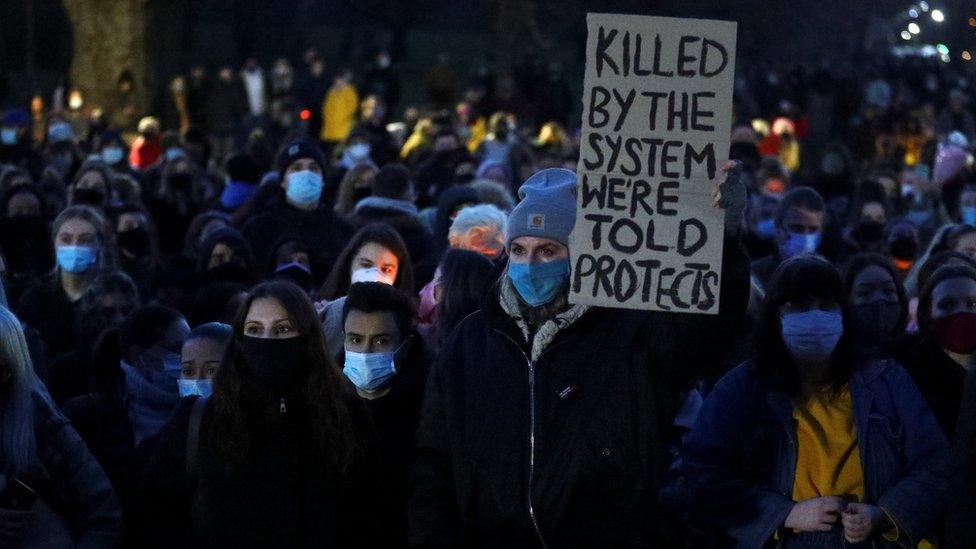
Many who gathered at Clapham Common held signs protesting violence against women
Reclaim These Streets urged mourners not to go to Clapham Common on Saturday after it called off the official vigil, asking them instead to light candles and shine other lights on their doorsteps at 21:30 GMT - to coincide with the time that Ms Everard was last seen.
But several hundred people gathered there to pay tribute to the 33-year-old - whose death has prompted a public debate over women's safety - despite Covid restrictions.
In a letter to Dame Cressida, posted on Twitter on Sunday,, external Reclaim These Streets accused the Met chief of putting those who attended "at a serious health risk through a lack of Covid-safe marshalling" and "at risk of being manhandled, fined and arrested" by officers.
The group said it believed the Met had misrepresented a High Court ruling on Friday, when a judge refused to say the event would be permitted under coronavirus regulations.
It recognised that the police faced "unprecedented challenges", but called on Dame Cressida to work with organisations and suggested it may still take "further legal action".
Among those who attended Saturday's vigil were members of Sisters Uncut, external. The group also held another event outside New Scotland Yard on Sunday, external - which it said was to remember Ms Everard and demonstrate against broader "police brutality".
One video posted online on Saturday showed officers removing women who were standing by the bandstand.
Cries of "shame on you" and "let them go" could be heard from onlookers. The video showed them being put in a police van and driven away.
Police said four arrests were made at the vigil to "protect people's safety".
Labour leader Sir Keir Starmer said the scenes were "deeply disturbing", external, while Liberal Democrat leader Sir Ed Davey has called for Dame Cressida to resign, external.
Delivering a statement in the early hours of Sunday, Met Assistant Commissioner Helen Ball said hundreds of people were "packed tightly together", posing a risk of transmitting Covid-19.
"We absolutely did not want to be in a position where enforcement action was necessary. But we were placed in this position because of the over-riding need to protect people's safety," she said in a statement.
Jamie Klingler, from Reclaim These Streets, said the event would have been "a lot safer" if it had been held officially, adding the group had 50 stewards who were "trained and ready to go".
The group added in a statement, external that it was asking Dame Cressida "to meet us urgently" to explain the actions taken by police.
Organisers said they cancelled a vigil originally planned at Clapham Common because police did not "constructively engage" with logistics
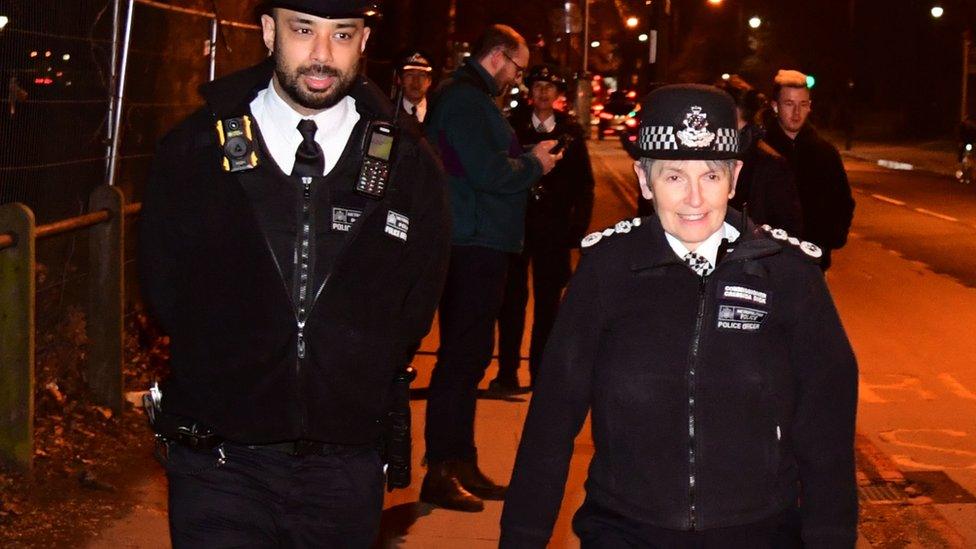
Dame Cressida Dick joined police officers at Clapham Common earlier in the week as part of reassurance patrols
Labour's shadow domestic violence minister, Jess Phillips, said the force had "got it wrong at every single turn".
Victims Commissioner for England and Wales Dame Vera Baird QC said there was no real prospect of police successfully intervening in the crowd, describing the circling of the bandstand as "quasi military".
Conservative MP Caroline Nokes, who chairs the Commons Women and Equalities Select Committee, tweeted, external: "In this country we police by consent - not by trampling the tributes to a woman who was murdered and dragging other women to the ground. Badly misjudged by #metpolice."
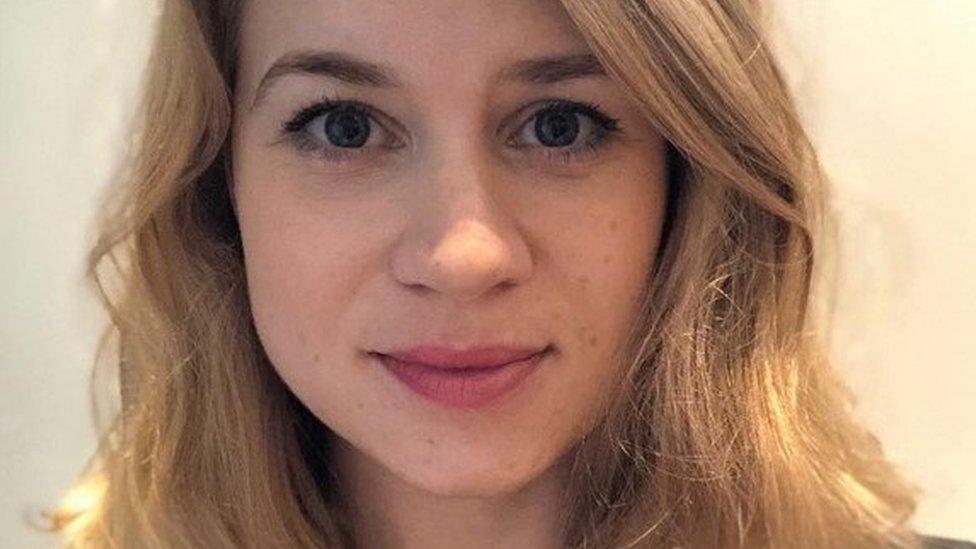
Sarah Everard had been walking to her home in Brixton when she disappeared
Tory MP Victoria Atkins tells Andrew Marr hate crime laws are "focused on minority groups", not women
On Sunday, people continued to visit the bandstand on the common to pay their respects to Ms Everard.
The BBC's Emily Unia, who has been at the scene, said there had been a "steady stream" of people visiting who had laid flowers and lit candles and stopped for a "moment of reflection".
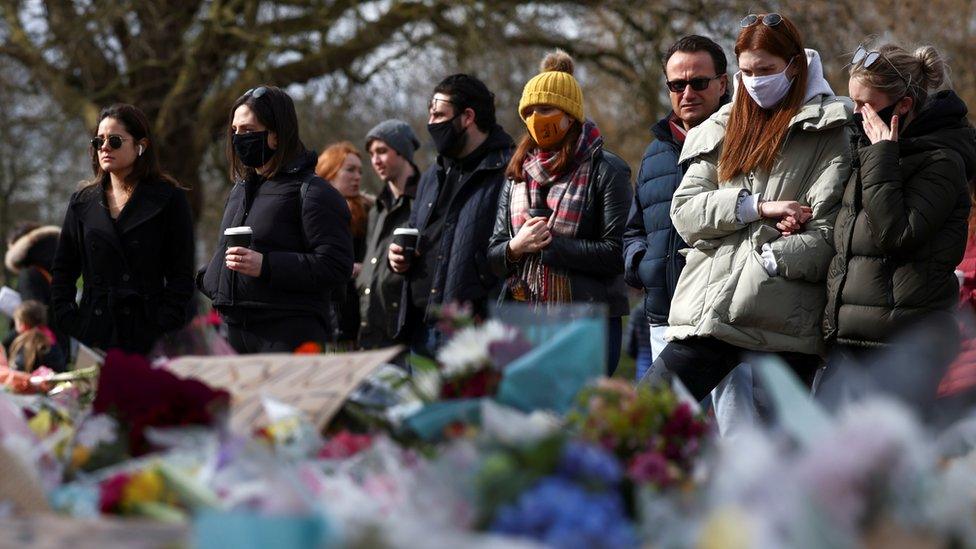
People continued to pay their respects on Sunday
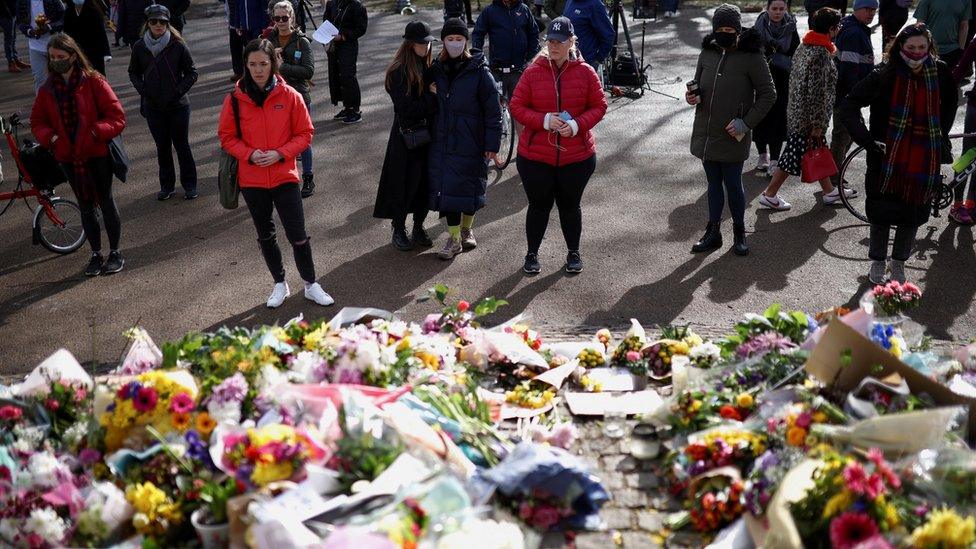
Visitors laid flowers and lit candles in tribute to Ms Everard
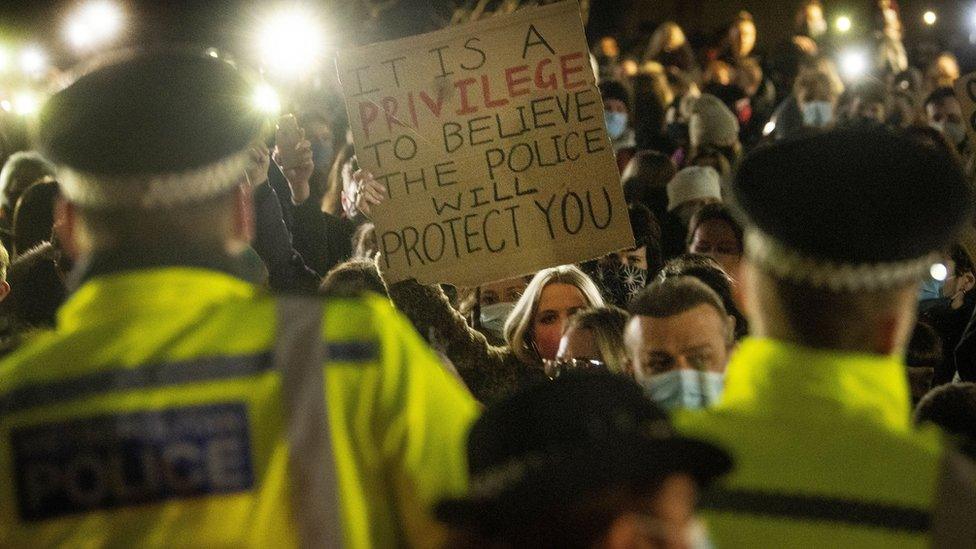
Hundreds gathered at a memorial site in Clapham Common
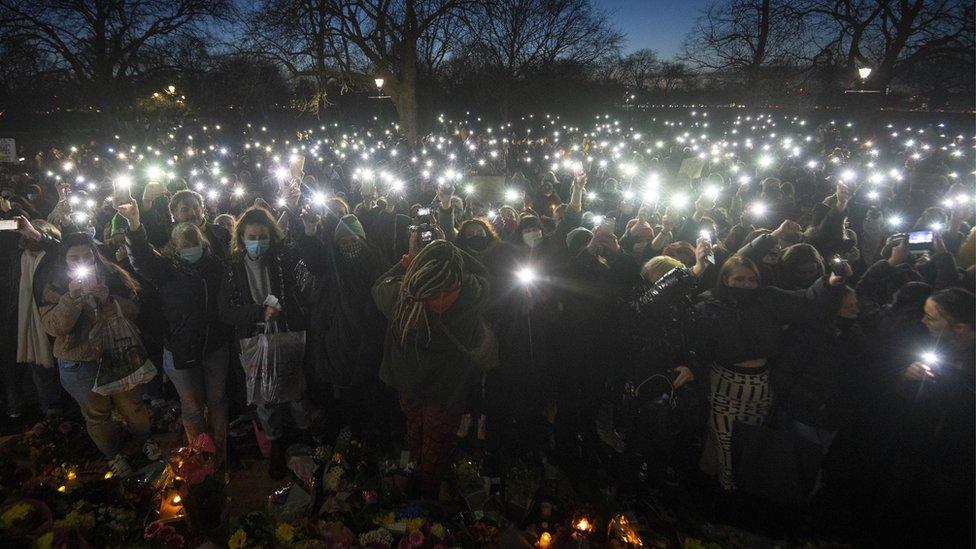
Hundreds turned on their phone torches at the bandstand in Clapham Common
On Saturday, Met Police officer Wayne Couzens, 48, appeared at Westminster Magistrates' Court charged with Ms Everard's kidnap and murder.
Mr Couzens was remanded in custody to appear again at the Old Bailey on 16 March.

What are the rules on gatherings in England?
Under the current lockdown rules two people can meet for recreation outside, which can include "coffee on a bench"
From 29 March people will be allowed to meet outdoors, either with one other household or within the "rule of six"
Police can break up illegal gatherings and issue fines of £10,000 to someone holding a gathering of more than 30 people
During last year's restrictions, when Black Lives Matter and anti-lockdown demonstrations took place, police took a hands-off approach to protests


Have you been affected by any of the issues raised? You can get in touch by emailing haveyoursay@bbc.co.uk, external.
Please include a contact number if you are willing to speak to a BBC journalist. You can also get in touch in the following ways:
WhatsApp: +44 7756 165803
Tweet: @BBC_HaveYourSay, external
Please read our terms & conditions and privacy policy
If you are reading this page and can't see the form you will need to visit the mobile version of the BBC website to submit your question or comment or you can email us at HaveYourSay@bbc.co.uk, external. Please include your name, age and location with any submission.


- Published30 June 2022
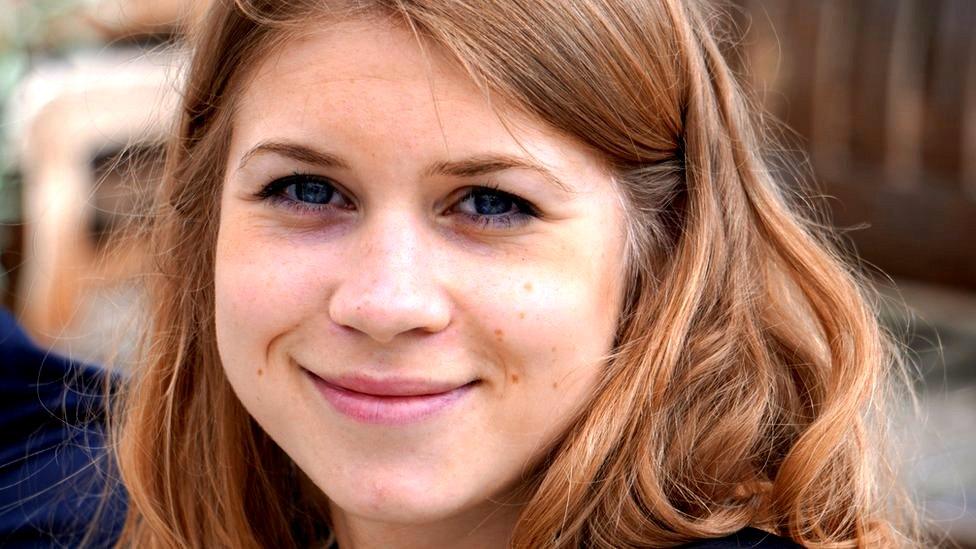
- Published11 March 2021
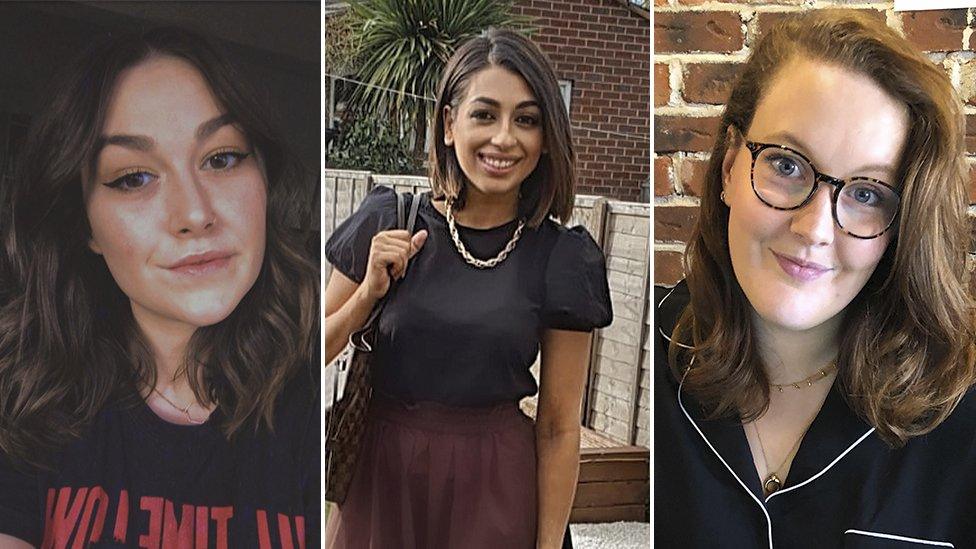
- Published12 March 2021
